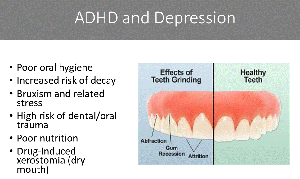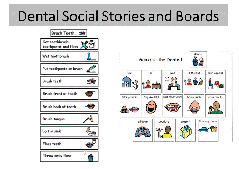Dental Health Care Challenges and Barriers for Persons with Neurodevelopmental Disabilities (MN LEND)
March 9, 2018

|
In our January 25th MNLEND cohort session, we had the honor to hear Katie Anderson, DDS 4th year dental student at the University of Minnesota School of Dentistry, 2nd year LEND Fellow, present information on "Common Dental Challenges and Preventive Dental Care for Persons with Neurodevelopmental Disabilities. Katie's presentation detailed the challenges that children and adults with NDD face in creating a good home dental health care, and suggested that it should start as soon as the eruption of the first tooth which is usually about 1 year old.1 Katie informed us that person's with NDD have a tendency to have poor oral health, some of the contribute factors may be related to effects due to medication, genetic predisposition, diet restrictions, physical and/or behavioral limitations that make performing daily oral care and cooperating during dental visits difficult, consequently they have a higher risk for developing dental pathologies.2
 Katie talked about several strategies that are being used in pediatric dentistry that are similarly used in educational and behavioral settings such dental desensitization, visuals preparation aids, dental social story boards, social stories, and sensory-adapted dental environments.3 In her presentation, Katie reported that according to the guidelines of the Commission on Dental Accreditation (CODA), graduates are now required to be competent in assessing the treatment needs of patients with special needs.4 Unfortunately, many general dentists do not feel competent in treating special needs patients. 5 In our state of Minnesota, the reimbursement rate for Medicare is a very low 31.1% as shown in a study in 2016 by the American Dental Association.6 The financial incentive may be the largest and important barrier from preventing general dentist in providing dental health service to the NDD population. When there is more financial incentive to service persons with NDD, then we will see these barriers dissipate.
Katie talked about several strategies that are being used in pediatric dentistry that are similarly used in educational and behavioral settings such dental desensitization, visuals preparation aids, dental social story boards, social stories, and sensory-adapted dental environments.3 In her presentation, Katie reported that according to the guidelines of the Commission on Dental Accreditation (CODA), graduates are now required to be competent in assessing the treatment needs of patients with special needs.4 Unfortunately, many general dentists do not feel competent in treating special needs patients. 5 In our state of Minnesota, the reimbursement rate for Medicare is a very low 31.1% as shown in a study in 2016 by the American Dental Association.6 The financial incentive may be the largest and important barrier from preventing general dentist in providing dental health service to the NDD population. When there is more financial incentive to service persons with NDD, then we will see these barriers dissipate.
Citations
-
ANDERSON2017, K.Common Dental Challenges and Preventive Dental Care for Persons with Neurodevelopmental Disabilities
- Morgan, John P., DDS, Paula M. Minihan, Phd, M, Paul C. Stark, MS, ScD, Mathew D. Finkelman, PhD, Konstantina E. Yantsides, BS, Angel Park, MS, MPH, Carrie J. Nobles, MPH, Wen Tao, MA, MM, and Aviva Must, Phd. "The Oral Health Status of 4,732 Adults with Intellectual and Developmental Disabilities" The Journal of the American Dental Association 143.8 (2012): 838-46. Web. http://jada.ada.org/article/S0002-8177(14)61796-7/pdf.
- Kerins, C., P. S. Casamassimo, D. Ciesla, Y. Lee, and N. S. Seale. "A Preliminary Analysis of the US Dental Health Care System's Capacity to Treat Children with Special Health Care Needs." Pediatric Dentistry. U.S. National Library of Medicine, n.d. Web. 22 Feb. 2018.
- Gupta, Niodita, MD.,MPD, Casandra Yarbrough, MPP, Marko Vujicic, PhD, Andrew Blatz, MS, and Brittany Harrison, MA. "Medicaid Fee-For-Service Reimbursement Rates for Child and Adult Dental Care Services for all States, 2016." American Dental Association (2017): 1-15. Web.







